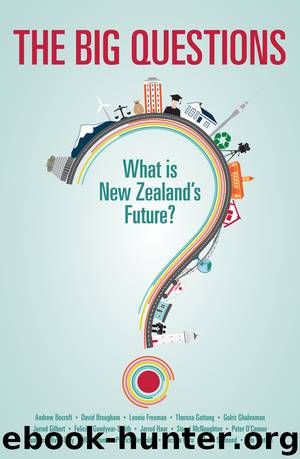The Big Questions by unknow

Author:unknow
Language: eng
Format: epub
ISBN: 9780143772385
Publisher: Penguin Random House New Zealand
Published: 2013-04-08T00:00:00+00:00
Cultural Well-being 2.0: social skills
A second priority is the skills of self-control and being socially adept; being empathetic, collaborative and able to appreciate another’s perspective. Right now these have a powerful role in educational trajectories, in post-school outcomes, and in a range of individual and collective benefits. And they will become increasingly significant, certainly for employment, but importantly for resilience and well-being across the life course. Facility with social media, AI and digital tools requires them, and they are skills for surviving the risks posed by these very same tools.
Like the critical skills, self-control and social skills can be taught, and from an early age. They need to be taught in a context of caring teacher and student relationships, and safe and orderly environments imbued with norms and values for high expectations and academic success. They, too, need to be deliberately taught within the everyday activities that teachers and students create across subject areas, both face-to-face and virtually; with active forms of learning, sufficient time being devoted, and careful monitoring.
These are not generic, abstracted skills. They are learned within, and are expressed within, specific activities. Both the content and the focus of teaching contribute. Reading high-quality books can increase empathy. Solving maths problems and critically reasoning in science topics, as well as reading canonical texts, can be vehicles for learning self-control and social skills. Equally significantly, collaboratively solving technology and maths problems, and critically reasoning with science topics, provide similar opportunities for promoting social skills. Secondary teachers have had a mantra that every teacher is a teacher of literacy. It is true. But the new myth’s mantra is that every teacher is a teacher of self-control and social skills.
I earlier reviewed how social media, the internet and other digital tools pose new challenges, both to self-control and to our interactions with others. The digital disinhibition effect means that, without thinking, children and young people can engage with the tools in ways that are harmful to mental health, their own as well as others’. Currently schools deal with this by promoting forms of digital citizenship in idiosyncratic and variable ways. Our new myth should underpin a national plan to systematically develop self-control and social skills, guaranteeing their learning for our children and their employment in digital contexts.
Although in its infancy, designing games with a focus on learning these skills is already happening. We can design for attributes like conscientiousness, intellectual openness, work ethic, teamwork, collaboration and leadership. But here again we need a planned research and e-development strategy.
Download
This site does not store any files on its server. We only index and link to content provided by other sites. Please contact the content providers to delete copyright contents if any and email us, we'll remove relevant links or contents immediately.
Kathy Andrews Collection by Kathy Andrews(10509)
The remains of the day by Kazuo Ishiguro(7543)
Spare by Prince Harry The Duke of Sussex(4188)
Paper Towns by Green John(4165)
The Body: A Guide for Occupants by Bill Bryson(3791)
Be in a Treehouse by Pete Nelson(3206)
Harry Potter and the Goblet Of Fire by J.K. Rowling(3025)
Goodbye Paradise(2950)
Never by Ken Follett(2873)
Into Thin Air by Jon Krakauer(2695)
The Remains of the Day by Kazuo Ishiguro(2614)
The Genius of Japanese Carpentry by Azby Brown(2602)
The Cellar by Natasha Preston(2592)
Drawing Shortcuts: Developing Quick Drawing Skills Using Today's Technology by Leggitt Jim(2529)
120 Days of Sodom by Marquis de Sade(2428)
Architecture 101 by Nicole Bridge(2348)
The Man Who Died Twice by Richard Osman(2290)
Machine Learning at Scale with H2O by Gregory Keys | David Whiting(2267)
Fairy Tale by Stephen King(2058)
